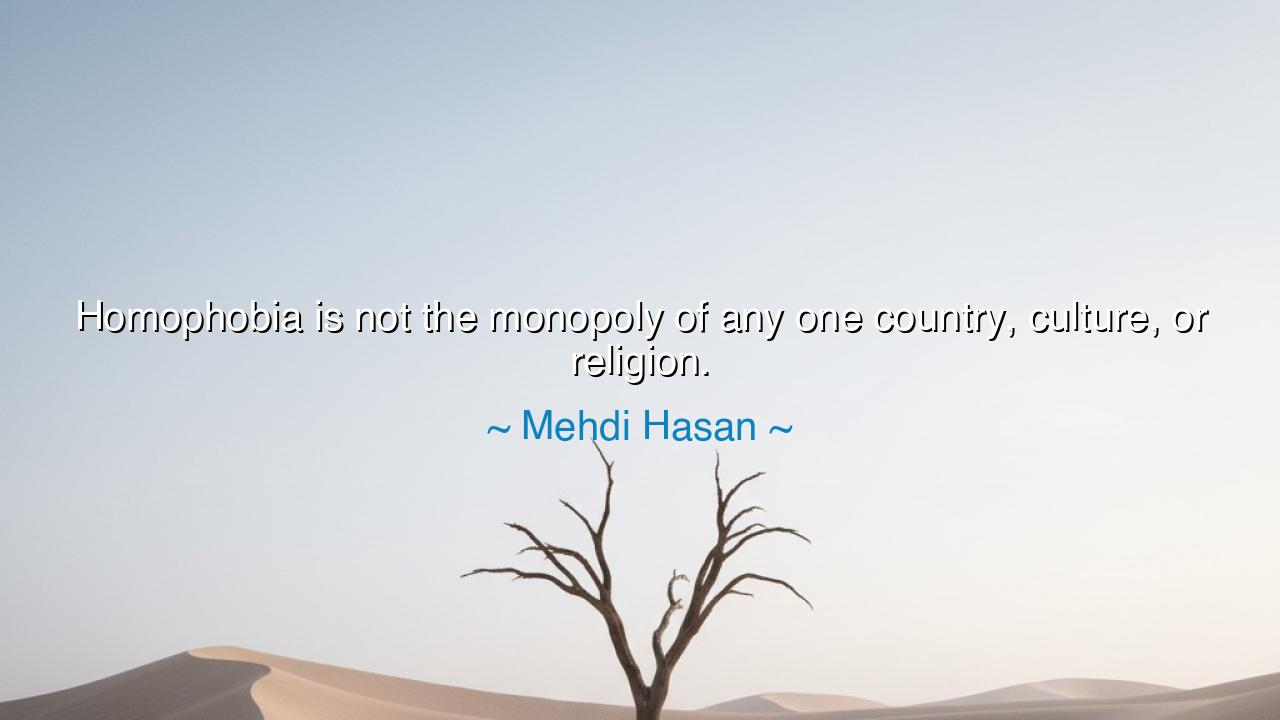
Homophobia is not the monopoly of any one country, culture, or






"Homophobia is not the monopoly of any one country, culture, or religion." – Mehdi Hasan.
In this profound declaration, Mehdi Hasan calls us to reflect on the universal nature of homophobia—an affliction that plagues every corner of the world, regardless of the nation, culture, or religion. The tendency to demonize or marginalize individuals based on their sexual orientation is not confined to a single community, nor is it restricted by geographical boundaries. It is a deeply ingrained issue that transcends borders, affecting people of all backgrounds. Whether we speak of the East or the West, the rich or the poor, no culture can claim to be free from this stain on humanity.
The ancient philosophers often spoke of virtue and justice as universal ideals that should guide all peoples, regardless of their background. The wisdom of Socrates, for instance, was not bound by the confines of Athens but spoke to the hearts of all men and women, calling them to live with integrity and respect for one another. In this same way, the injustice of homophobia is not limited to any one group; it is a human problem, one that reveals the limitations of our collective understanding of love, respect, and human dignity.
Consider the history of the world, where every culture, from the ancient civilizations of Egypt, Greece, and Rome, to the empires of India, China, and Persia, has, at times, marginalized those who fall outside of accepted norms. In ancient Greece, despite the famous works of philosophers and thinkers like Plato and Aristotle, there existed a deep tension regarding sexual identity. On the one hand, some accepted a variety of sexual expressions, yet many others, especially in later periods, turned their backs on such freedom, choosing instead to demonize those who did not conform to their specific views of masculinity and femininity.
The Middle Ages, a time often romanticized for its chivalry and devotion to faith, also marked a period of extreme prejudice toward those who did not conform to established norms, including in matters of sexuality. Religious dogma reinforced ideas that certain desires or behaviors were sinful, and those who acted upon them were often persecuted, their lives marked by shame, punishment, and fear. This deeply ingrained intolerance continued through the ages, shaping attitudes in societies across the globe. It was not confined to any single culture or religion; instead, it reflected a universal ignorance of the diversity of human love and the dignity that each person deserves.
In the modern world, this issue persists. From the laws that still criminalize homosexuality in many countries, to the cultural taboos that enforce silence and exclusion in others, homophobia remains an entrenched global issue. In the United States, for example, LGBTQ+ individuals have long fought for equality and recognition in the face of societal pressures, often feeling the sting of prejudice within even their own families and communities. Activists like Harvey Milk and Marsha P. Johnson, who boldly advocated for the rights of sexual minorities, faced not only political opposition but also the deeply entrenched cultural prejudices that shaped their world.
The lesson in Mehdi Hasan's words is clear: homophobia is not something we can dismiss as a problem of “other” nations or cultures. It is a shared human issue that requires our collective effort to overcome. Whether in the streets of New York, the villages of Africa, or the bustling cities of Asia, prejudice based on sexual orientation is something that affects us all. To call it the monopoly of any one culture is to deny the universality of human suffering and to ignore the common thread of injustice that runs through all our societies.
Therefore, the practical action we must take is to unite against ignorance and intolerance. Each of us must take responsibility for our own biases, examine the cultures and communities we belong to, and recognize the ways in which homophobia continues to persist. In our everyday lives, we must speak out against hatred, support those who are marginalized, and educate ourselves and others on the importance of respecting every individual, regardless of their sexual orientation. Solidarity is key—just as in the past, when individuals like Martin Luther King Jr. and Mahatma Gandhi fought for equality and justice, it is through our shared commitment to love and humanity that we can build a more just world for all.
Let us move forward with the knowledge that homophobia is not a problem of the “other” but a reflection of human limitation and fear. We must break down these walls of prejudice, one act of kindness and acceptance at a time, until we reach a place where every person is free to love and be loved without the fear of judgment or discrimination. True wisdom lies in understanding that the freedom of others enriches our own humanity, and in this, we are all connected.






AAdministratorAdministrator
Welcome, honored guests. Please leave a comment, we will respond soon